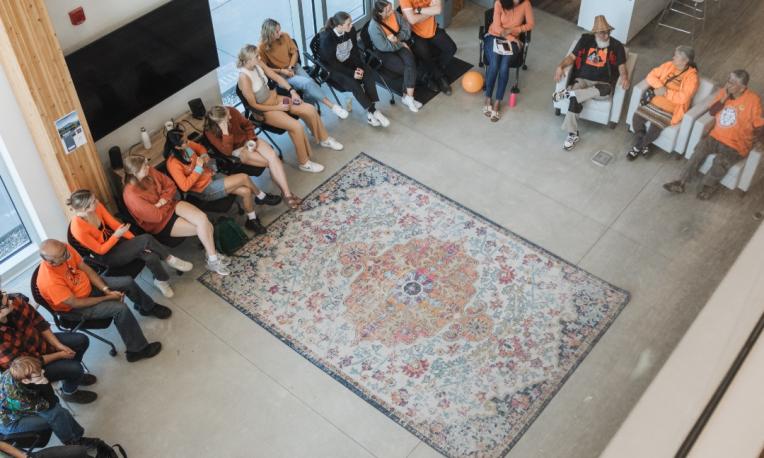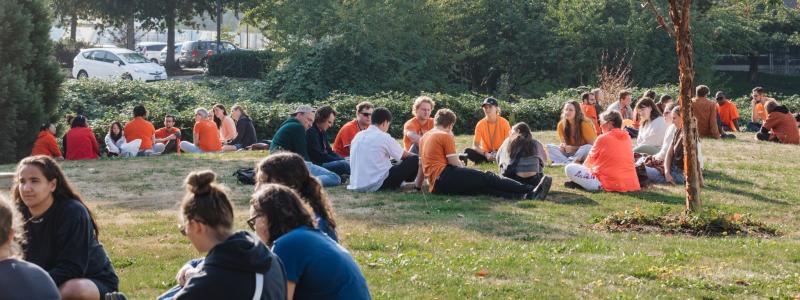In preparation for Canada’s National Day for Truth and Reconciliation, TWU will bring the campus community together for a Day of Learning on Sept. 26 focused on Indigenous knowledge and perspectives.
TWU students, staff, and faculty are invited to join in commemorating the history and legacy of residential schools and in fostering greater understanding of Indigenous knowledge and culture.

What is the Day of Learning?
Canada's National Day for Truth and Reconciliation on Sept. 30 honours the Indigenous victims and survivors of residential schools, as well as their families and communities. TWU joins with people across Canada in recognition of the painful history and ongoing impact of residential schools.
We encourage students, staff, and faculty to attend the Day of Learning on Sept. 26, as we walk together in this reconciliation process.
How do I prepare for the Day of Learning?
You are invited to wear an orange shirt to the Day of Learning, and you are encouraged to bring a pair of children’s shoes (gently used or new) that we will use in the Opening the Circle ceremony. The shoes will then be donated to children in need.

Sept. 26, 2025 – Day of Learning Program
9 a.m. | Opening the Circle | David E. Enarson Gymnasium
We begin the day together at 9 a.m. with an Opening the Circle to start the day with Stó:lō protocol and ceremony. The purpose of gathering is to learn and grow in our understanding of the history and legacy of Indian residential schools, and to honour the survivors, their families, and communities. University Siya:m Patricia Victor Switametelót, Stó:lō, along with several Indigenous elders and leaders, will lead us in our time together.
1–3 p.m. | Learning Activities | Langley campus various location
Workshops and learning opportunities will be available in the afternoon 1–3 p.m. throughout the Langley campus. See below for workshop details and locations. Activities run concurrently, commencing at 1 p.m. Registration is required.
Register for Learning Activities here.
- Movie: Sugarcane
Reimer Student Centre, 2nd Floor, Alumni Hall
After years of silence, the forced separation, assimilation and abuse many children experienced at residential schools was brought to light in 2021 with evidence of unmarked graves on the grounds. Set amidst a groundbreaking investigation, Sugarcane illuminates the beauty of a community breaking cycles of intergenerational trauma and finding the strength to persevere.
- Movie: WaaPaKe
DeVries Auditorium
For generations, the suffering of residential school survivors has radiated outward, impacting Indigenous families and communities. Dr. Jules Arita Koostachin’s deeply personal documentary WaaPaKe (Tomorrow) moves beyond intergenerational trauma, with an invitation to unravel the tangled threads of silence and unite in collective freedom and power.
- Language Documentation and Revitalization
Canada Institute of Linguistics, Harvest Centre, Room 208/209 | 1:00 p.m.—3:00 p.m.
Come learn about the many Indigenous languages spoken in BC and across Canada. Try out a few phrases in Halq’eméylem and hear how communities are working to document and renew their heritage languages.
- Blanket Exercise
RNT 121
Using Indigenous methodologies, the goal is to build understanding about our shared history as Indigenous and non-Indigenous peoples in Canada by walking through pre-contact, treaty-making, colonization, and resistance. Everyone is actively involved as they step onto blankets that represent the land, and into the role of First Peoples. Please bring a blanket with you.
- On the Land
Ubuntu Pavillion
The land is a gift from Chichel Siyá:m and holds our stories, songs, and prayers. The land is rich in plants and medicines. Listen to an Indigenous knowledge-keeper teach about Xpá:y, and take a walk in the Ecosystem Study Area to find the wealth and health provided by the land.
- Reconciliation through Art
SAMC Gallery
In this workshop, Northwest Coast Indigenous artist, Sus Cho, Randall Bear Barnetson, will share about his new exhibition Susdli. Participants will be immersed in storytelling and Northwest Coast art forms exploring themes of identity and becoming.
- Oral Tradition
Group A: Kuhn 115/116
Group B: Kuhn 106
Indigenous peoples have long passed on knowledge from generation to generation through oral traditions, including storytelling. Storytelling is a traditional method used to teach about cultural beliefs, values, customs, rituals, history, practices, relationships, and ways of life. It is a foundation for holistic learning, relationship building, and experiential learning. Join the sharing circle as Elders and Knowledge-keepers share their stories.
- Indigenous Stories Matter
RNT 122
Reflections and conversations about the importance of Indigenous literatures; the value of storytelling (both written and oral) for increasing our ethical and moral response to injustice, oppression, and racism; and the significance of including Indigenous Ways of Knowing in our learning.
- Paddle Journey
Meet at Outdoor Centre, RNT
The land and the waters continue to support Stól:ō cultural and economic practices while serving as a source of knowledge and memory, alongside traditional teachings and laws. Hear the teachings and enjoy a paddle in the canoe.
- Letse’mot and Letse’thale
RNT 235
Reconciliation can be described as learning to walk in a good way. Hear some teachings from a Stól:ō leader on the importance of relationships, faith, and intentional, purposeful pursuit of truth and reconciliation.
- Arts-based approach to MMIWG Report
RNT 125
The Report reveals that persistent and deliberate human and Indigenous rights violations and abuses are the root cause behind the staggering rates of violence against Indigenous women, girls, and 2SLGBT+ people. Arts-based educational strategies create space and place for diverse groups to dialogue and explore how to engage with and respond to MMIWG.
- Family story
RNT 234
A son and his mother will share their story of intergenerational trauma and intergenerational strength. Colonization disrupted who God created them to be, but God’s redemption continues to bring healing, wholeness, and victory in their lives.
3:15 p.m. | Closing the Circle | David E. Enarson Gymnasium
Following the afternoon of learning activities, once again we will gather together in the Gym at 3 p.m., ending the day with Stó:lō protocol.

About Indigenous Initiatives at Trinity Western University
At TWU, we seek to hear, understand and acknowledge our shared history with Indigenous peoples and the impact that it continues to have throughout the generations. As a global Christian university, TWU continues to foster greater knowledge and understanding of Indigenous cultures, worldview, and history among students, staff, and faculty. We do this by providing educational opportunities, engaging in community partnerships, and through caring for and supporting Indigenous students.
Learn more at TWU's Indigenous Initiatives.
About Trinity Western University
Founded in 1962, Trinity Western University is a global Christian liberal arts university dedicated to equipping students for life. Uniting faith and reason through Christian teaching and scholarship, TWU is a research institution offering undergraduate and graduate degrees in the humanities and sciences as well as in several professional schools. It has campuses in Canada in Langley, Richmond, and Ottawa. Learn more at www.twu.ca or follow us on Instagram @trinitywestern, Twitter @TrinityWestern, on Facebook and LinkedIn. For media inquiries, please contact: media@twu.ca.

